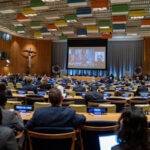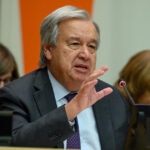"Quo vadis sustainability? Five key takeaways from climate and sustainable development week in New York"
Last week’s big event shed some fascinating light on the progress we have made toward our shared commitments, though we were also reminded of the huge challenges we still face in building a greener and more inclusive world. Once again this year, the UN General Assembly in New York hosted the SDG Summit and New York Climate Week, which featured plenty of initiatives and events related to the Sustainable Development Goals (SDGs) and climate action.

As is customary, governments, regions, cities, companies, financial institutions and other civil society organizations were all invited to take part in the event, making it without doubt the most important week of the year when it comes to sustainability. An annual event that is rapidly gaining in importance and in which the role of the financial industry has been steadily growing with each year that goes by.
Looking back at the week, we would single out five key issues that dominated the agenda.
The first one was surely the opportunity to take stock of the progress made toward the SDGs. We have made it just past the halfway line since the goals were approved back in 2015. Notably, UN Secretary General António Guterres proclaimed that “today, only 15 percent of the targets are on track and many are going in reverse.” And he made it abundantly clear that we must step up our efforts because the SDGS “are about the hopes, dreams, rights and expectations of people and the health of our natural environment. They’re about righting historical wrongs, healing global divisions and putting our world on a path to lasting peace.”
According to the WEF, more than half of the world’s total GDP is moderately or highly dependent on nature.
Secondly, we saw how nature and natural capital have taken center stage following the publication of the TNFD (Task Force on Nature-related Financial Disclosures) recommendations. This sister framework to the TCFD’s climate-related recommendations follows a pragmatic approach and reflects the huge challenge relating to data availability. It will enable companies and financial institutions alike to explain the extent to which their business is reliant on natural capital, as well as the related impacts and risks and opportunities. Lest we forget, according to the WEF, more than half of the world’s total GDP is moderately or highly dependent on nature. We expect the TNFD to set the bar when it comes to the new reporting standards for financial institutions now on the drawing board in Europe and, foreseeably, worldwide under the ISSB (International Sustainability Standards Board).

António Guterres, Secretary-General of the United Nations, during his speech at the United Nations Climate Ambition Summit in New York. - ONU
The other major theme of the week was credibility and the progress effectively made in addressing climate change. The focal point was the UN Climate Ambition Summit, which was held with the aim of spurring governments, businesses, financial institutions, local authorities and civil society into action, while listening to the first movers and doers, meaning those spearheading the climate agenda. The Secretary General had a clear message to convey at the end of the event: “What we have seen today is that a meaningful number of countries, regions, cities, companies and financial institutions are already fully aligning their policies and their strategies with the 1.5°C goal. And if these first movers can do it, everyone can do it.” BBVA was extremely proud to be among only a handful of financial institutions in the world to have been invited to attend this hugely important event, at which we were represented by our Chair, Carlos Torres Vila.
The fourth major issue of the week was the pressing need for greater support from developed countries to emerging economies. The event allowed for further progress toward the overarching reform agenda of the World Bank and other multilateral financial institutions, which should culminate next October in Marrakech. The investment gap between these countries is as much as two trillion dollars per year and we must now create attractive conditions conducive to attack private capital on a sufficient scale.
We must provide more financing to green activities and projects, while also supporting the transformation of business models in sectors that are hard to decarbonize and investing in innovation and new technologies.
Last but not least, the importance of transition finance was underscored last week. We must provide more financing to green activities and projects, while also supporting the transformation of business models in sectors that are hard to decarbonize and investing in innovation and new technologies. Highlights here included the announcement made by Janet Yellen, U.S. Secretary of the Treasury, regarding the Principles for Net-Zero Financing & Investment, as well as the publication by GFANZ (Glasgow Finance Alliance for Net Zero) of guidance to define the contribution made by financial institutions toward decarbonization. BBVA took part in the face-to-face meeting of the Steering Group of the Net-Zero Banking Alliance and also in the conference on transition plans organized by UNEP FI and GFANZ, at which it shared its experiences.
It was also a week to celebrate the fourth anniversary of the launch of the Principles for Responsible Banking, with remarkable progress made so far by the 325 signatories, which represent 50% of the world’s total banking assets.
SDGs, natural capital, credibility and implementation, support to emerging countries and transition financing. Five key topics in what was also a momentous event for companies that place sustainability at the heart of their strategies and that are looking to have a positive impact on the world. Five keys to help us answer the question: quo vadis with sustainability?